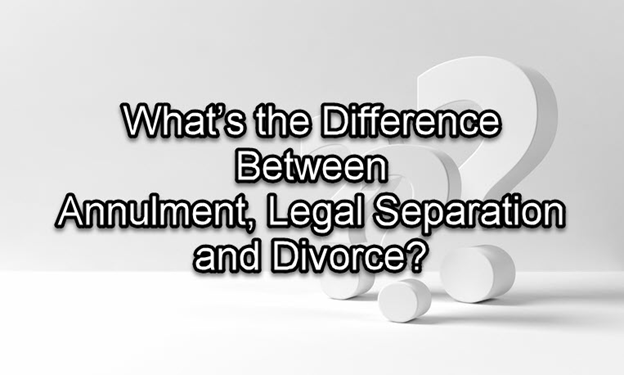
Moving a Child out of the State
October 7, 2024My Partner is Tracking my Car!
October 21, 2024When it comes to ending a marriage, many individuals in New Jersey find themselves confused between the legal processes of annulment, separation, or divorce. These options differ significantly in terms of their requirements, legal implications, and potential outcomes.
ANNULMENT
In New Jersey, annulment is a legal process that declares a marriage null and void, as if it never existed. The grounds for annulment in New Jersey are relatively limited and more stringent compared to those for divorce.
Annulment focuses on proving that the marriage was void or voidable from the beginning.
The following are the recognized grounds for annulment in New Jersey:
- Impotence: If either spouse was physically unable to engage in sexual intercourse at the time of marriage and the other spouse was unaware of this condition, an annulment may be granted.
- Incest: If the spouses are closely related by blood, such as siblings or parent and child, the marriage may be annulled.
- Bigamy: If one spouse was already married to another person at the time of the marriage, the subsequent marriage can be annulled.
- Lack of consent: If either spouse was unable to give valid consent to the marriage due to mental incapacity, intoxication, being a minor at the time of marriage, or any other reason, an annulment may be granted.
- Fraud or misrepresentation: If one spouse misrepresented important facts or engaged in fraud that induced the other spouse to marry, an annulment can be sought.
- This includes situations where one spouse conceals a prior criminal record, a sexually transmitted disease, or an inability to have children.
Time. Annulment requires specific evidence to prove the grounds for annulment, so it can be a more complex and time-consuming process than a divorce. There is no time limit to annulment, however the longer the marriage the weaker the argument for annulment becomes and the stronger the argument for a divorce is.
Children. Moreover, because the marriage will be treated as though it never existed, any children born would be deemed to have been born out of wedlock.
Finances. Because annulment treats the marriage as if it never existed, there is no equitable distribution or alimony. This leaves both parties responsible for their individual debts and assets, and perhaps assigning a split responsibility for debts incurred during the marriage.
- Prenups and postnups will be declared invalid because there were meant to apply to marriage that, due to annulment, essentially never enlisted.
SEPARATION
For couples who are experiencing marital difficulties, but are not quite ready to file, they often consider a separation as an intermediate step. Separation is not one-size-fits-all, and because New Jersey does not recognize a formal legal separation, the process can be different for every individual couple. The various types of separation include:
- Trial Separation. Still married but living separately. Sometimes this means living in the same house in separate rooms, and sometimes one spouse moves out on a trial basis.
- This does not change your legal rights and responsibilities towards your children or your spouse.
- An agreement should ideally be drawn that outlines:
- Who will stay in the marital home
- How expenses will be handled
- What parenting time with the children will look like
- A timeline for the duration of the separation
- Other sexual partners
- There can be legal implications as it pertains to moving out of the house and parenting time if the couple later decides to divorce, so consulting an attorney at the trial separation stage would be a wise decision.
- Permanent Separation. Separation becomes permanent when you and your spouse decide to split up for good. Any property, assets, or debts acquired after this date most often are treated as separate property if the parties proceed to a divorce.
- Not all couples decide to divorce at this point. Some couples are content to simply live apart permanently but to remain married.
- If parties do not proceed to a divorce, it is decided on a case-by-case basis whether assets and property earned after the separation date are treated as joint property. We advise you to speak with an attorney promptly to draft an agreement to clarify the terms of the separation and provide protections for both parties.
- Divorce from Bed & Board. This is nicknamed the “limited divorce” and it is an option for married couples who want to separate but aren't ready for a full divorce. It allows couples to address issues like child support, alimony, and property division, while ending most of the financial aspects of their marriage. This is more common in situations where parties cannot divorce for religious or political reasons.
- Both parties must fully agree to the divorce from bed and board.
- Parties are still legally married and cannot remarry
- The couple foregoes any rights to inherit from each other or to put a claim against the other’s estate.
- Couples can later file a full divorce if they choose or, if they reconcile, they can apply for a suspension or revocation of their separation filing.
- Property acquired after a divorce from bed and board is separate property and is not subject to marital division.
- Drawback
- Health Insurance companies often deny coverage to the other spouse, even though the parties are legally still married. The other spouse can appeal the decision, and fight it, but it can cost significant money and take extensive time, which may not always be ideal.
Takeaway: A separation agreement is, in many cases, the most fitting option.
DIVORCE
A divorce, opposite of an annulment, ends a legally recognized marriage.
Divorce in NJ can be granted based on no-fault grounds, such as irreconcilable differences, or on fault grounds, such as adultery or extreme cruelty. While those differences are discussed more in depth here, the short of it all is that with a divorce, parties are going from being considered as one, to being regarded as separate individuals.
This means that any property, savings, or assets acquired from the marriage will need to be examined and divided.
Parenting time and custody will need to be determined for the parties’ children.
Wives may choose to change their last names.
Parties may divide pensions, 401(k)s, 403(b)s, etc.
It is a lot more involved of a process than either an annulment or a separation.
It is crucial to consult an attorney before moving forward with an annulment or divorce. Likewise, if your spouse serves you papers, seek legal advice regarding your options for fighting the divorce or seeking the best possible outcome.
Call our experienced attorneys at 865-795-0020 to schedule a free consultation.
*This web site is designed for general information only. The information presented on this site should not be construed to be formal legal advice nor the formation of a lawyer/client relationship.


